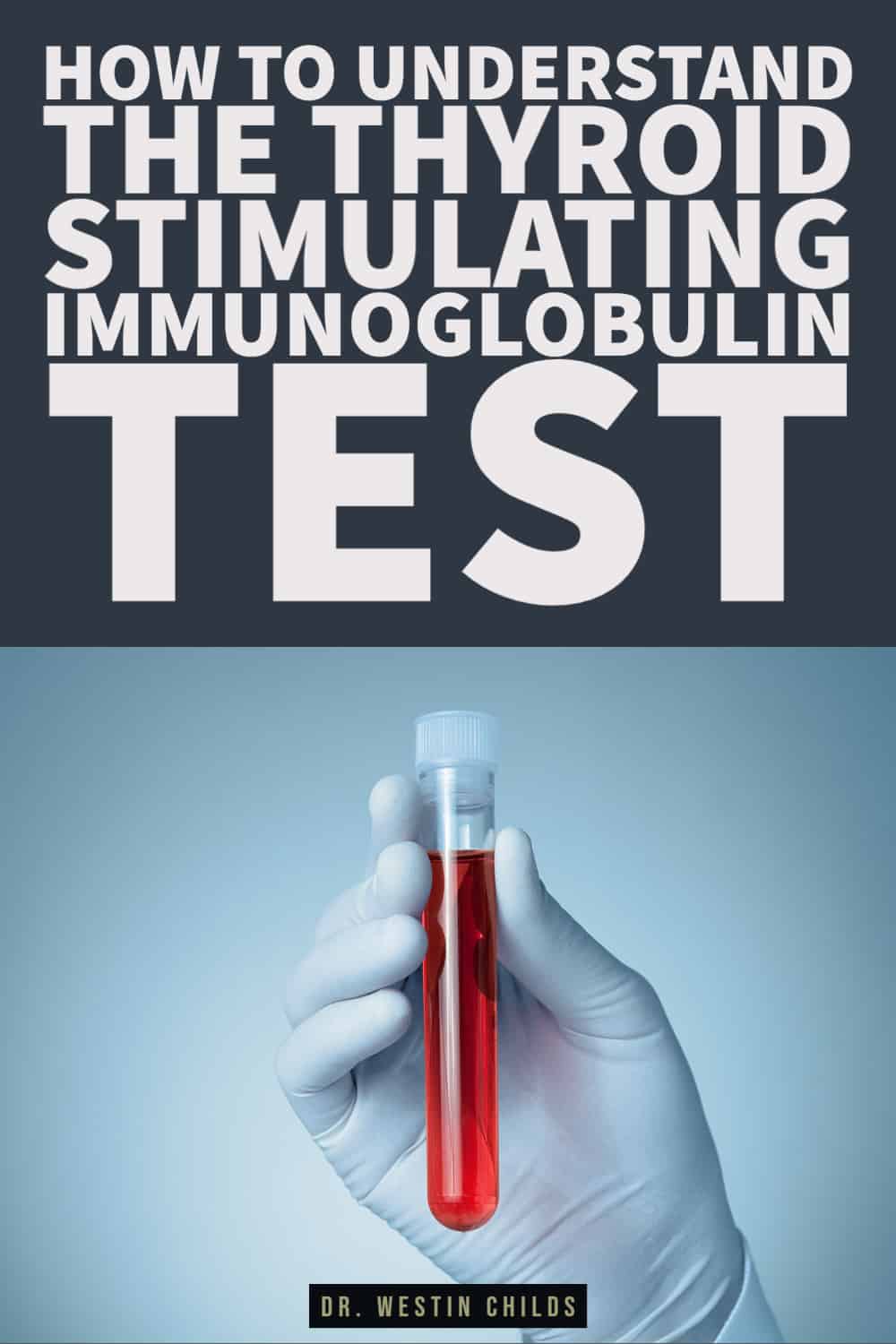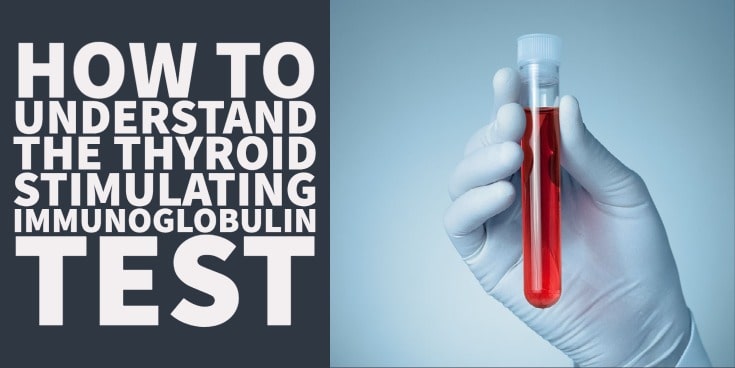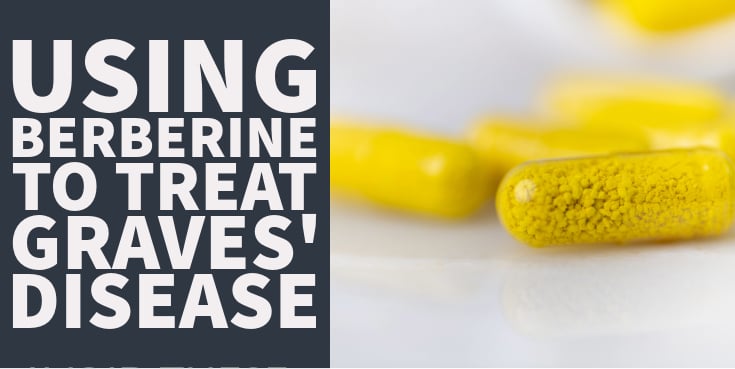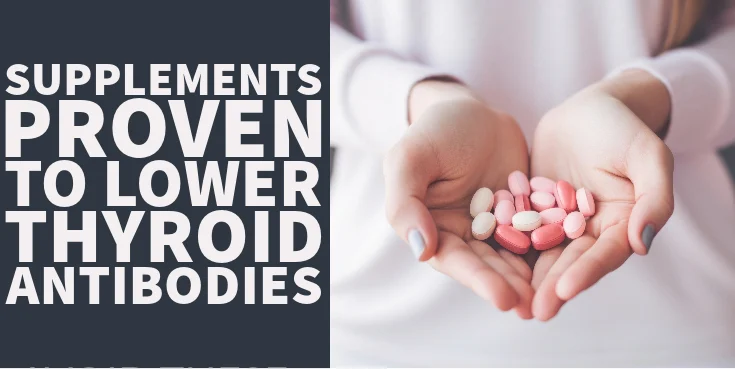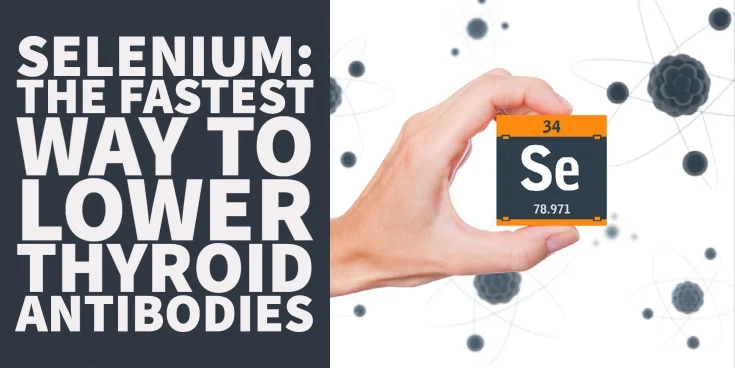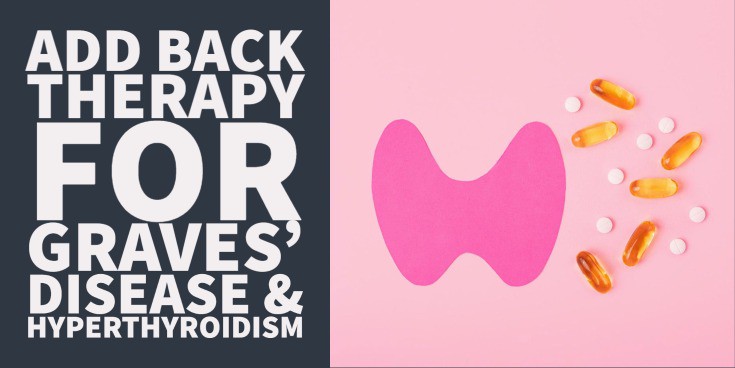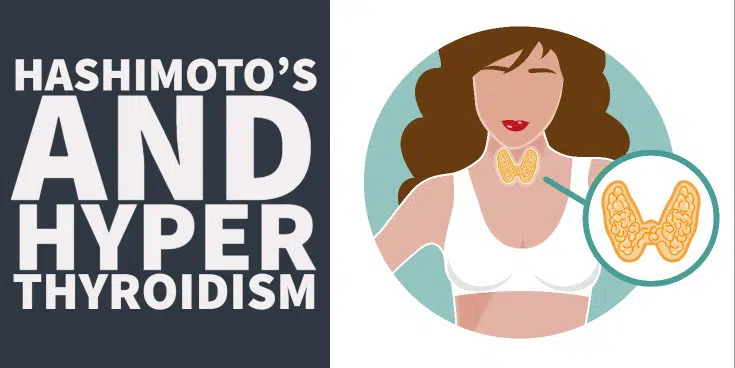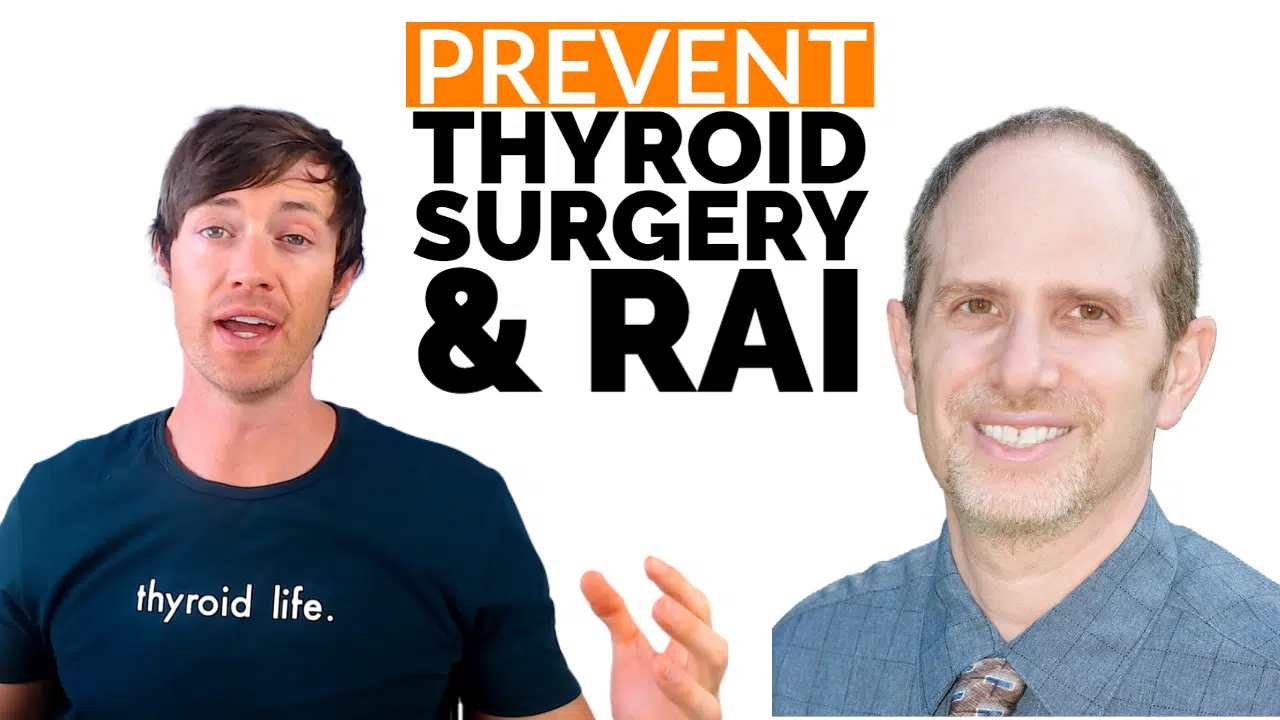What does thyroid stimulating immunoglobulin mean?
Do your results correlate with the severity of your hyperthyroidism?
Is there a way to lower your antibody levels?
You probably already know that the presence of these antibodies may be an early warning sign that your body is suffering from an autoimmune disease, but what are you supposed to do about them?
Learning more about the TSI lab test can help you to understand your condition and understand treatment options.
What is Thyroid Stimulating Immunoglobulin?
Thyroid stimulating immunoglobulin or TSI for short (1) is the name of a blood test that is used to identify the presence of autoimmune disease in those with hyperthyroidism.
An abnormally high level of TSI in your body is highly predictive of a condition known as Graves’ disease (2).
Graves’ disease is an autoimmune disease of the thyroid gland in which your body produces antibodies that sit on and activate thyroid hormone production.
This production results in high levels of thyroid hormone which causes the symptoms of hyperthyroidism.
Graves’ disease is only one cause of hyperthyroidism so it’s important to order this test if you have hyperthyroidism to help determine the CAUSE of your condition.
TSI should be differentiated from other thyroid antibodies such as thyroglobulin antibodies and thyroid-peroxidase antibodies which tend to cause a different thyroid condition known as Hashimoto’s thyroiditis.
This patient guide will help you understand if your TSI levels are abnormal, what to do if you suspect Graves’ disease, why it’s important to monitor your antibody levels, and how to potentially reduce them.
DOWNLOAD FREE RESOURCES
Foods to Avoid if you Have Thyroid Problems:
I’ve found that these 10 foods cause the most problems for thyroid patients. Learn which foods you should avoid if you have thyroid disease of any type.
The Complete List of Thyroid Lab tests:
The list includes optimal ranges, normal ranges, and the complete list of tests you need to diagnose and manage thyroid disease correctly!
Reference Range & Interpreting Your Lab Results
How do you know if your antibody levels are optimal?
When it comes to TSI (thyroid stimulating immunoglobulin) testing you’ll find that there is a standard “reference range”.
This range is developed based on “normal” healthy adults and if you fall within this range you are considered to also be “normal”.
But let’s break this down a little bit more:
If the presence of antibodies in your body means that there is a chance that you may have an autoimmune disease, doesn’t it make sense to want this number as close to zero as possible?
I would tend to agree with you on that, and therefore I tend to prefer when patients have a TSI level as close to zero as possible.
The standard range for TSI is measured as a percentage and the cut-off for normalcy is usually less than 1.4 (140%) or 1.3 (130%) (3).
This means that you can have a result of 130% and still be considered “normal” even though you are rapidly approaching the high end of that range.
The “high end” of the normal range is considered to be 140% which means that the closer you get to this range the closer you are to developing abnormal test results and the closer you are to a diagnosis of Graves’s disease.
Because of this, it is preferable to have your percentage as far away from that “high end” as possible, in this case as far away from 140% as possible.
Thyroid Function Tests Associated with High TSI
If your TSI lab tests are abnormal then your doctor will also order several tests to identify the function of your thyroid gland.
These tests are often ordered at the same time, but in some cases, you may need to go back for repeat testing.

This is important because not every single case of elevated TSI is indicative of Graves’ disease, so testing your thyroid function can weed out those who are outliers.
In the presence of high TSI levels and hyperthyroid symptoms your thyroid function tests will most likely resemble this pattern:
This pattern is highly indicative of a hyperthyroid state in your body and an indication that you may also be suffering from Graves’ disease.
Symptoms Associated with Elevated TSI
The presence of thyroid-stimulating immunoglobulin has a very specific effect on your thyroid gland.
As the name describes, these antibodies attach to your thyroid gland and “stimulate” it.
What does it mean if your thyroid gland is “stimulated”?
In this case, it means that they force your body to autonomously (without normal feedback loops) produce thyroid hormone.
This causes a condition known as hyperthyroidism or thyrotoxicosis as your body struggles to cope with high levels of thyroid hormone.
Under normal conditions, you want a small and steady amount of thyroid hormone in your body, but when this level becomes too high you may begin to experience certain symptoms.
Because your thyroid helps to regulate your metabolism, gastrointestinal function, weight, hair growth, and so on, you might expect that these tissues start to suffer as your thyroid levels fluctuate.
And that’s exactly what happens as thyroid levels increase.
Your body begins to speed up and you may experience any or all of the following symptoms:
- Hair loss (as hair turnover increases)
- Fatigue (due to overconsumption of energy and ATP)
- Weight loss (as your metabolism speeds up)
- Diarrhea (as your intestinal tract speeds up)
- Heart palpitations or a rapid heart rate (as your heart rate speeds up)
- Tremors of the hands or extremities
The severity of these symptoms depends on how high your thyroid levels are.
Extremely high levels of thyroid hormone may result in severe symptoms or a condition known as thyroid storm, which is a medical emergency.
It’s important to realize that the presence of any of these symptoms is not normal and should be evaluated by your Doctor.
If you or your Doctor suspects that you have hyperthyroidism you should also get thyroid function testing done at the same time (more on that above).
These symptoms, while present, can be very alarming but they tend to subside as you are treated for your condition.
What Triggers Elevated TSI Levels?
Graves’ disease is, by definition, an autoimmune disease.
An autoimmune disease means that your body is attacking itself due to some process that has led to confusion in your immune system.
Under normal conditions, your body should NOT attack itself, and it should not have a problem differentiating between foreign invaders and your own tissue.
In autoimmune diseases, such as Graves’ disease, there is a cross-reactivity between your own tissue and your immune system.
The hallmark of Graves’ disease is the presence of TSI which latch on to and activate your thyroid gland resulting in an increase in thyroid hormone in your body.
But what triggers the creation of these antibodies?
What if we were able to stop the “trigger” or “prevent” it from triggering your immune system further?
As you can imagine, this is a topic that is under intense research currently because it would potentially mean a “cure” for autoimmune diseases.
Believe it or not, our current treatment for autoimmune diseases focuses on the suppression of the immune system rather than attempting to reverse the trigger of immune dysfunction.
But emerging research has shed light on to what may be triggering immune dysfunction.
I’ve included a brief list below of known triggers of autoimmune disease (including Graves’):
- Increased intestinal permeability (4) – Permeability refers to how protective your intestinal lining is against bacteria and food particles. Damage may cause this lining to allow for particles to be absorbed into your body that shouldn’t be there.
- Molecular mimicry (5) – Molecular mimicry refers to a condition in which certain bacterial capsules look similar to your own tissue. So as your body creates antibodies to fight off certain bugs these antibodies look like your own tissue and there is some cross-reactivity.
- Viral infections (6)
- Bacterial infections (7)
- Toxins (8) – Certain toxins can damage the immune system.
- Dietary considerations (9) – The foods that you eat may cause inflammation or damage to the intestinal lining and change the composition of gut bacteria.
Do Antibodies Levels Correlate with Disease Progression?
You might expect that higher levels of thyroid stimulating immunoglobulin may correlate with a worse clinical picture.
Meaning:
The higher your antibodies become the more likely you are to experience the symptoms of hyperthyroidism.
Unfortunately, this doesn’t always appear to be the case in every patient, but testing your antibodies frequently may be helpful in some instances.
We know, from other studies, that at least some autoimmune disease severity does correlate with the absolute antibody level associated with that disease (10).
And some studies do show that there is a positive correlation between the severity of thyroid eye disease and the initial TSI level (11).
What does this mean?
It means that the higher your antibody level is at the time of diagnosis the more likely you are to develop thyroid eye disease.
What is not known, however, is if your antibody level correlates with more severe symptoms of hyperthyroidism (such as heart palpitations, tremors, and so on).
It seems that some of your thyroid tissue tends to be less responsive to TSI stimulation based on the fact that some thyroid cancers do not progress at an accelerated rate in the presence of TSI (12).
Either way, it may be in your best interest to attempt lifestyle changes that promote the reduction of these antibodies.
Lowering Antibody Levels
We’ve already established that it may be worthwhile to attempt to lower your antibody level if you suffer from thyroid eye disease, but is it actually possible?
Again, we don’t have many studies focusing on this area, usually because the treatment of Graves’ focuses more on medications to block thyroid function and not to block thyroid antibody production.
Having said that, it still may be worthwhile for you to attempt certain therapies to try and lower your antibodies.
We know that certain factors can trigger the presence of autoimmune disease.
Factors (listed above) such as increased intestinal permeability, certain nutrient deficiencies, exposure to infections, and so on.
It may be possible to “bolster” your immune system by addressing these problems.
One of the main issues with this approach is that it is not well studied, meaning you don’t know if these therapies will necessarily work for you or not.
But, provided that the potential negative risk of the therapies does not outweigh the potential positive outcome, I see little reason why you wouldn’t want to try them.
Therapies that you may want to consider to help lower TSI levels include:
- A healthy diet high in fruits and vegetables and low in refined and processed foods – Eating a healthy diet can help improve the composition of bacteria in your gut, reduce inflammation and help your body naturally obtain the nutrients that it needs.
- Supplements such as Zinc, Vitamin D, and Selenium – Deficiencies in zinc and Vitamin D have been shown to increase your risk of developing autoimmune disease (13). Selenium has also been used to help lower antibodies in Hashimoto’s thyroid disease (14) which is another autoimmune disease of the thyroid gland.
- Potential use of LDN (low dose naltrexone) – Low dose naltrexone is a prescription medication that can be used off-label to help treat inflammatory conditions (15) and some autoimmune diseases (16). It is not well studied but some patients have experienced a reduction in their autoimmune symptoms that they attribute to the medication. It has few negative side effects, is relatively cheap (around $40 per month), and may be worth a 1-2 month trial in some patients.
Conclusion
TSI is a lab test used to identify Graves’ disease.
It can be easily ordered in cases where hyperthyroidism is suspected based on your symptoms and it is most useful when ordered in combination with other thyroid lab tests.
The presence of elevated TSI is highly predictive of Graves’ disease.
The absolute level of antibodies in your body may be useful to know because it may correlate with your risk of developing thyroid eye disease.
There may also be natural ways to reduce these antibodies by targeting lifestyle therapies.
These therapies may not work for everyone, but they are worth a shot in many patients.
Now I want to hear from you:
Do you have elevated TSI?
Have you been able to get adequate treatment?
Have you been able to lower your levels?
What has worked for you? What hasn’t?
Leave your comments or questions below!
